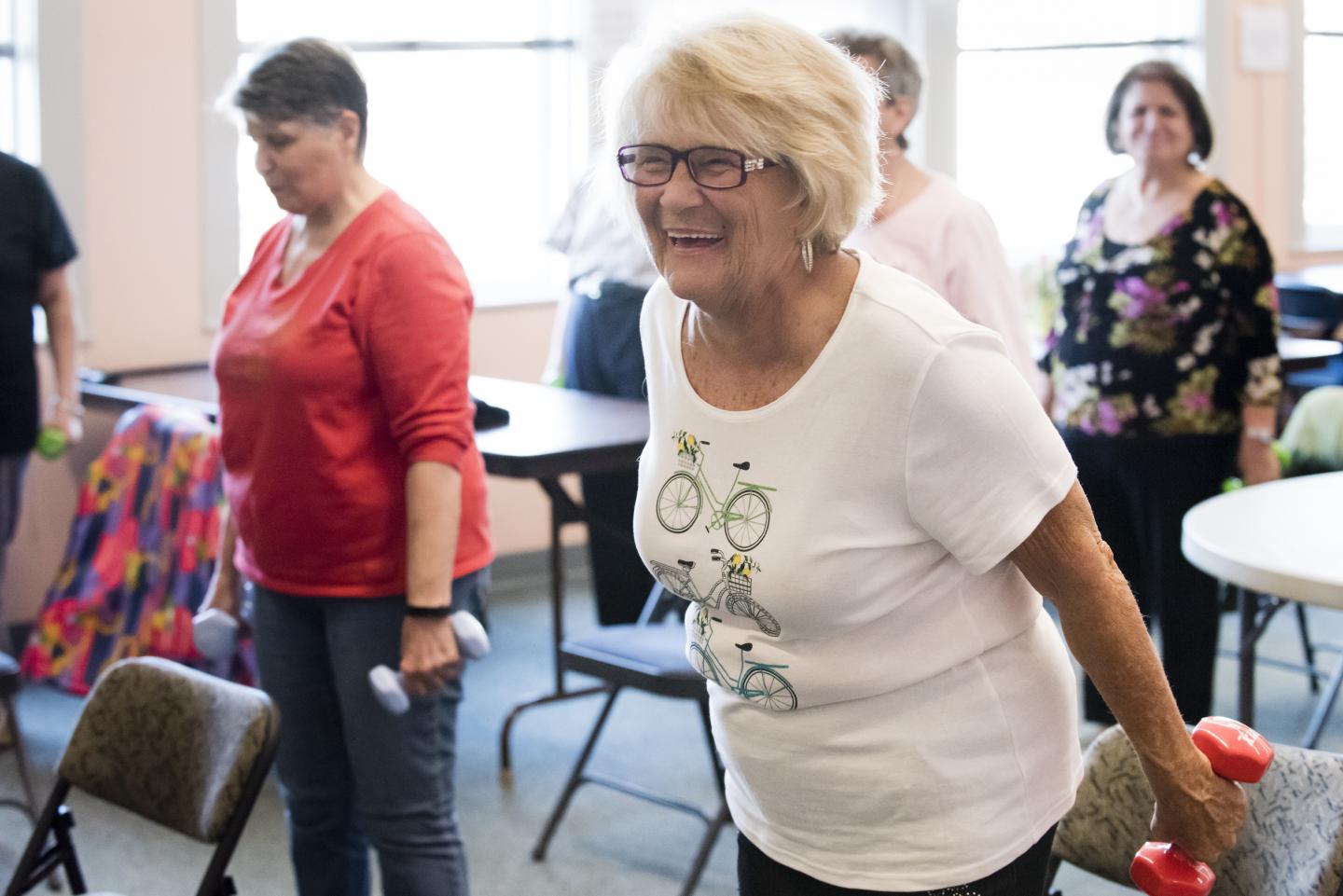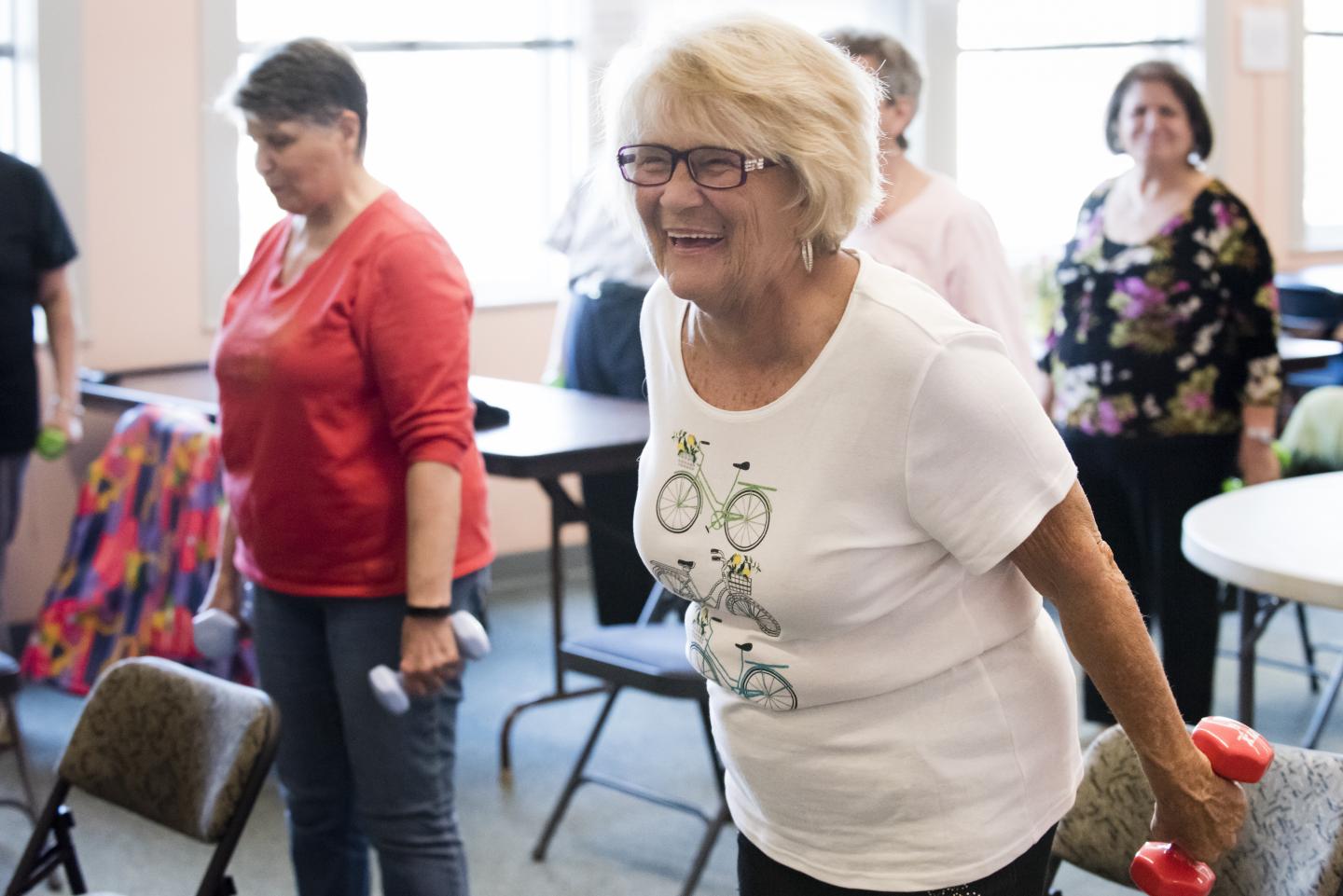
Credit: Alonso Nichols/Tufts University
BOSTON (July 16, 2018)–Immobility in old age can lead to lower independence and quality of life and increased risk for falls and chronic disease. In the Lifestyle Interventions and Independence for Elders (LIFE) study, a large multicenter clinical trial, researchers found that a regular program of structured physical activity performed in the clinical setting could reduce mobility loss in older adults. Could this program work in a real-world environment?
In a pilot study conducted at the Somerville Council on Aging in Somerville, Mass., a team led by researchers from the Jean Mayer USDA Human Nutrition Research Center on Aging (USDA HNRCA) at Tufts University for the first time attempted to translate the physical activity benefits of the LIFE clinical trial to a community senior center setting. The results were published as a Brief Report in the Journal of Gerontology: Medical Sciences on July 16.
The pilot study revealed that bringing the physical activity intervention from a controlled clinical environment into a community-based setting for older adults, with minimal study exclusions, was safe and feasible. Participants who attended at least 25 percent of the scheduled weekly physical activity classes demonstrated sustained improvements in their mobility over the six-month study period. Further, the researchers noted that the physical activity program was associated with increases in executive cognitive function, improvements in quality of life, and a notable reduction (approximately 60 percent) in the occurrence of falls. No serious adverse events occurred among physical activity participants.
"The overarching objective of the pilot study was to translate the physical activity program from a rigorously controlled clinical setting to a representative, real-world environment for older adults. We wanted to test whether the physical activity intervention could be safely and effectively integrated within the existing infrastructure of the senior center," said first and corresponding author Kieran F. Reid, Ph.D., M.P.H., scientist in the Nutrition, Exercise, Physiology, and Sarcopenia Laboratory at the USDA HNRCA. "The results are very encouraging."
The six-month pilot study enrolled 40 adults age 65-89 years with mobility limitations. Half were randomly assigned to a structured program of walking, strength, flexibility and balance training; half participated in a health education control group. Adherence rates, mobility levels, cognitive function, quality of life, depressive symptoms, and risk of falling were compared between the two groups after six months.
"With an increase in prevalence of mobility limitations in a growing aging population, introducing effective physical activity interventions to a community-setting can lead to big changes for these vulnerable populations," said senior author Roger A. Fielding, Ph.D., senior scientist and director of the Nutrition, Exercise, Physiology, and Sarcopenia Laboratory at the USDA HNRCA.
The authors note some limitations of the study, including the small sample size and short duration of the intervention. The team is developing a larger-scale translational study to demonstrate the impact of a physical activity intervention in a variety of community-based settings.
###
Additional authors on this study are Jonathan Laussen, Karan Bhatia, Davis Englund, and Dylan R. Kirn, Jean Mayer USDA Human Nutrition Research Center on Aging at Tufts University; Lori Lyn Price, Institute for Clinical Research and Health Policy Studies at Tufts Medical Center, and Tufts Clinical and Translational Science Institute; Todd Manini, Department of Aging and Geriatric Research at the University of Florida; Christine Liu, Jean Mayer USDA Human Nutrition Research Center on Aging at Tufts University, and Boston University School of Medicine; and Christopher Kowaleski, City of Somerville Council on Aging at the Somerville Health and Human Services Department.
This study was supported by awards from the National Institutes of Health's National Center for Advancing Translational Sciences (UL1TR001064), the Boston Claude D. Pepper Older Americans Independence Center (1P30AG031679), and by the U.S. Department of Agriculture's Agricultural Research Service. The content is solely the responsibility of the authors and does not necessarily represent the official views of the National Institutes of Health. Any opinions, findings, conclusion, or recommendations expressed in this publication are those of the authors and do not necessarily reflect the view of the U.S. Department of Agriculture. For conflicts of interest disclosure, please see the study.
Reid, K.F. et al. (2018) Translating the Lifestyle Interventions and Independence for Elders clinical trial to older adults in a real-world community-based setting. Journal of Gerontology: Medical Sciences. doi: https://doi.org/10.1093/gerona/gly152
About the Jean Mayer USDA Human Nutrition Research Center on Aging at Tufts University
For three decades, the Jean Mayer USDA Human Nutrition Research Center on Aging at Tufts University has studied the relationship between good nutrition and good health in aging populations. Tufts research scientists work with federal agencies to establish the Dietary Guidelines, the Dietary Reference Intakes, and other significant public policies.
Media Contact
Lisa LaPoint
[email protected]
@tuftspr
http://www.tufts.edu
Related Journal Article
http://dx.doi.org/10.1093/gerona/gly152





